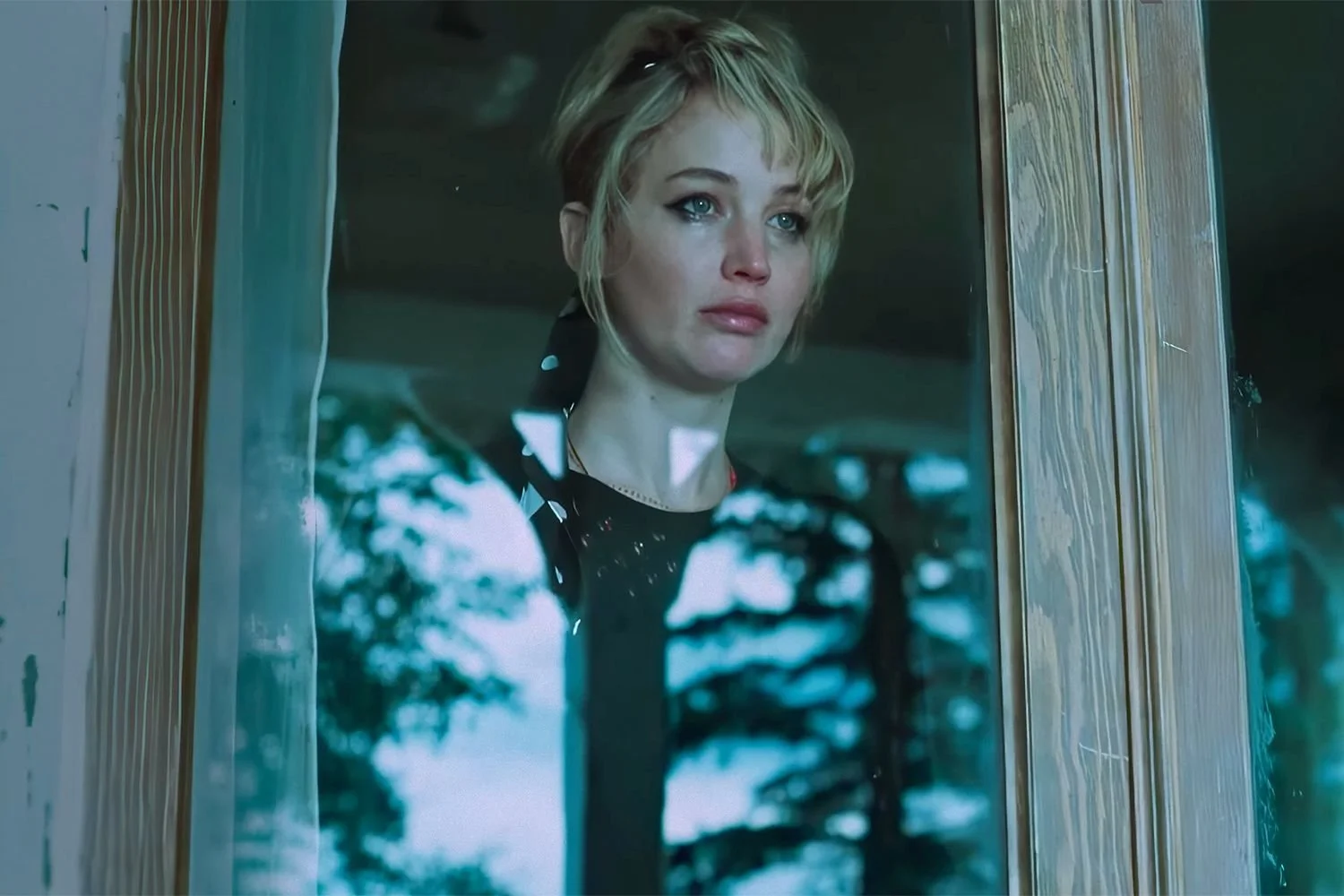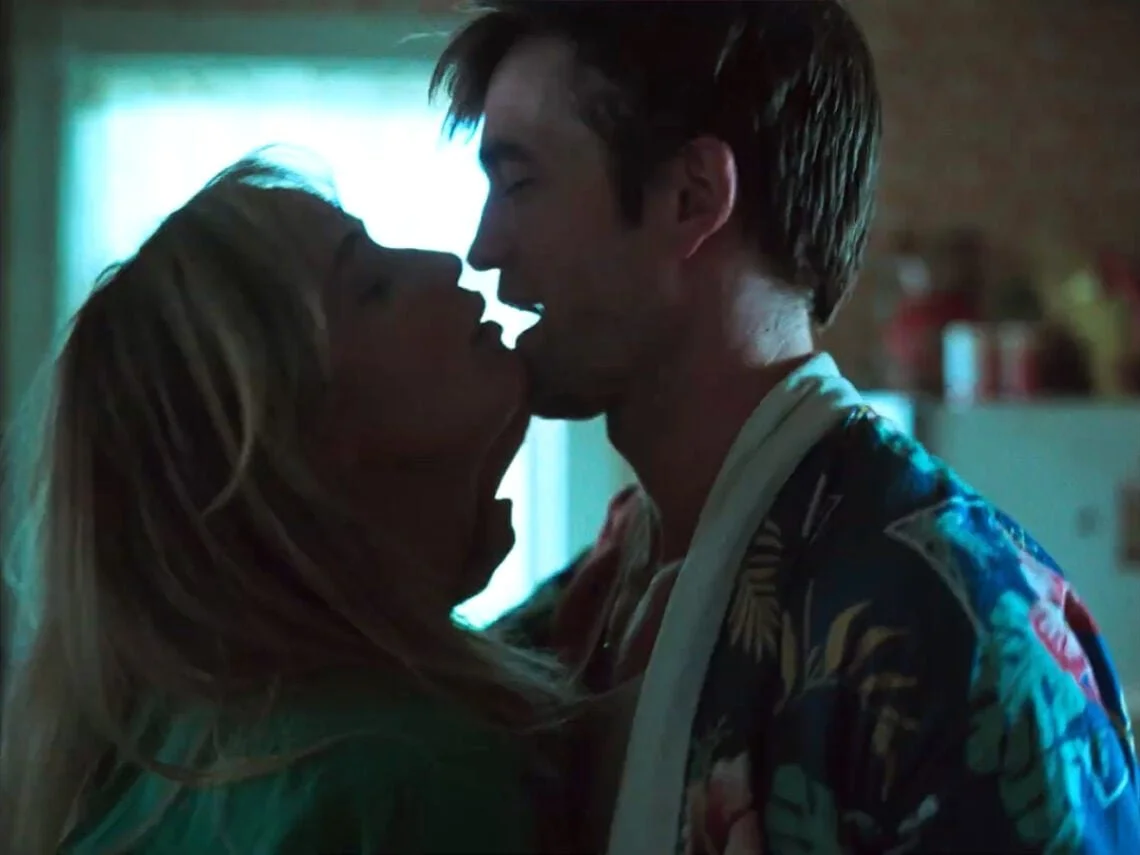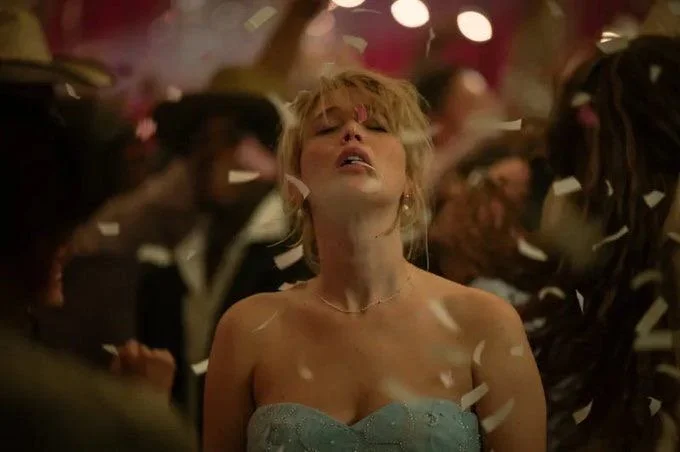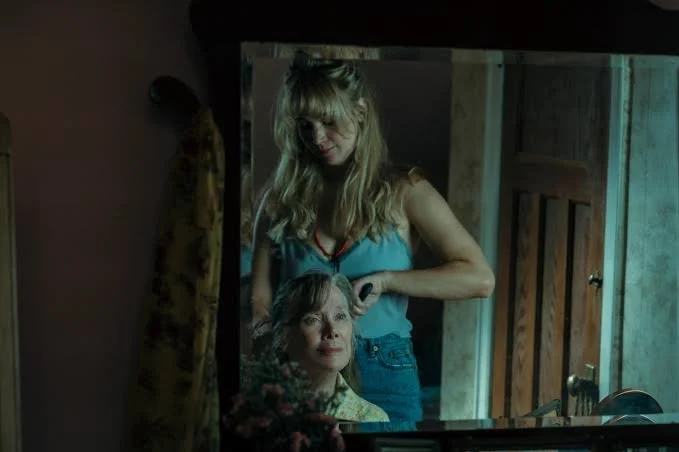Woman on the Verge: What 'Die My Love' Gets Right About Female Rage
By Georgia Mills
I’m not a mother and I’m not married, but I found myself thinking: Ugh, relatable, more than once, while watching Die My Love in theaters.
Still from Die My Love (2025)
Grace, played with fervor by Jennifer Lawrence, is a woman on the verge. Isolated in the upstate countryside with her husband (Robert Pattinson), she’s a new mother without anyone to talk to, or anything that isn’t housework or child-rearing to do. She spends her days listening to records and playing with the baby while her husband’s at work, her sense of identity (and reality) slipping away.
Over time, Grace’s mental state deteriorates. She’s consumed by loneliness and a deep lack of fulfillment that propels her to commit increasingly self-harming acts of violence (charging through a glass door, smashing her head against a mirror, attempting to jump from a moving vehicle). She is, as we have been trained to see women on the verge as, “crazy.”
I’ve been thinking a lot about “crazy” women recently. I spent Halloweekend hungover, curled up on my couch, smoking weed and binging classics like Jennifer’s Body, Gone Girl, and Fatal Attraction. When I first watched these tales of good-girls-gone-bad, I thought that Jennifer deserved to die, Amy was a monster, and Alex was insane. Upon this rewatch, now armed with a fully developed frontal lobe and a slate of my own crazy-girl moments under my belt, I found myself relating to each of these tragic women in new ways. What stood out even more clearly was how their painfully mediocre male counterparts weren’t just unsupportive, but the very architects of the crazy-making environments around them—isolating them, domesticating them, and shaping the suffocating conditions that ultimately became their undoing.
Still from Die My Love (2025)
As such, Die My Love was the first movie in this canon that I’ve watched where I related to our anti-hero leading lady right out of the gate. I also have wanted to claw down the yellow wallpaper of my life, propelled by a mirthy mix of sexual frustration, the desire to be seen and heard without condescension, and animalistic feelings of depraved grief and rage.
Following a brief stint at a Girl, Interrupted-esque institution, Grace returns home to a welcome-back party thrown by her husband, fit for a Stepford wife. She’s able to play along for a while before comments about her renewed health (“thank god you’re normal again!” being the underlying sentiment) break her.
She chugs a bottle of rosé, and when a housewife remarks that she looks “so much better!”, Grace seems to derive great pleasure in replying:
“So do you!” with her teeth bared in a snarling smile.
I, too, have experienced the violent desire to snap in this way, during the darkest time of my life when nothing felt real. The rage-demon inside of my chest would lurch forward, begging to be freed, and I would cannibalistically direct it back inward. In retrospect, I wish that I had let it out a bit more.
Trapped by the trad-wife confines of her life, Grace expresses her lascivious desire to be free with the one piece of agency she has left: her body. She snaps her gum obnoxiously and rests her dirty bare feet on the dash. She rolls around in the grass with the married next-door neighbor (which may have just been a masturbatory fantasy). She crawls on all fours like an animal (how I feel right before my period, I thought).
Still from Die My Love (2025)
In flashbacks, we see rowdy glimpses into her and her husband’s sex life: jumping like kids onto each other in the kitchen, massaging each other’s feet, lying naked on the living room floor. Following the birth of their child and their move upstate, they stop having sex, which is a deep driving factor in Grace’s unravelling.
For Grace, sex is the realization of her desires outside of her identity as a wife and mother. It’s the one physical act she has left that is purely self-serving, for her own pleasure. As Grace and her husband’s dry spell progresses, she begins to channel her sexual frustration into strange physical behavior, becoming freer and freer in terms of the space she occupies. She’s often in some state of undress, moving languidly to a rhythm that no one else can hear.
“Don’t you ever just want to be really fucked??” Charlotte screams, martini drunk in Sex and the City. In the theatre, I wanted to scream “FUCK YOUR WIFE!!!” at RPatz.
Still from Die My Love (2025)
There’s a freedom-from-suffering theme here: following a car accident, Grace puts down the wounded family dog when her husband refuses to do so.
In a last-ditch effort to get laid, Grace attempts to seduce her husband in the truck parked outside of their house while his mother (played by Sissy Spacek) watches the baby. When he refuses, Grace explodes in a fit of rage, charging into the house and locking herself in the bathroom, clawing at the wallpaper with her fingernails, smashing the sink. As she pools their soaps and shampoos on the floor, making a pile of slime, I thought: I too have been that sexually frustrated before.
Sarah Hoover explores this in The Motherload, a memoir about her experience with postpartum depression following the birth of her son. Her husband ceases to see her as a sexual being and cheats on her, which is her final straw: she kicks him out and finally seeks help (in Die My Love, Grace becomes increasingly paranoid that her husband is cheating on her with diner waitresses and random women in his truck).
Obviously, Grace’s mental health is a key factor in her unravelling. It’s unclear whether she’s suffering from postpartum depression, psychosis, or has some underlying mental health condition like bipolar disorder.
When she finally receives the care that she needs, it’s not from her husband. It’s in a moment at the end that made me cry, between Grace and her mother-in-law.
Still from Die My Love (2025)
Her mother-in-law has also been lonely, experiencing her own break from reality brought on by grief. Isolated in her house in the country following her husband’s passing, she sleepwalks with a gun, maniacally laughing along gravel roads until she wakes, horrified at how she’s travelled so far from home.
Throughout the movie, Grace consistently rejects her mother-in-law’s offers to see her in her suffering, to support her as much as she can.
At her welcome party, following a tragicomical, dramatic outburst in which Grace loudly declares that she SHOT THE FAMILY DOG!, her mother-in-law turns to her and says: Grace.
The room is silent as the two women gravitate towards each other and hold hands.
Grace replies: Pam.
They hold each other’s gaze, and the rest of the party falls away: they’re standing in the eye of the storm together. This is what the Barbie movie wanted out of that Margot Robbie, Rita Perlman encounter: an older woman who’s lived it, wholly seeing and acknowledging a younger woman who is going through it.
It’s the acknowledgment that Grace needs to be set free: being seen, loved, and accepted without judgment. She smiles and runs out of the house, her husband doggedly following behind as she strips off her clothes and charges headfirst into the forest that she will soon set ablaze. What’s real, what’s not, we can’t be sure, but when she turns to her husband and says, “Enough,” we believe her.





